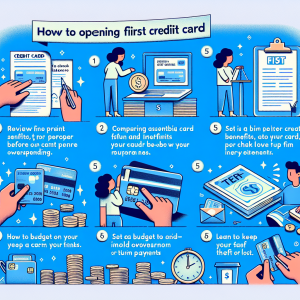Opening your first credit card is a significant milestone in your financial journey. It represents a step towards building your credit history, increasing your purchasing power, and potentially earning rewards. However, it also entails responsibilities and risks that require careful consideration. This article provides essential tips to help you understand the basics of credit cards and evaluate your financial readiness before taking the plunge.
Understanding the Basics of Credit Cards
Credit cards are financial tools that allow you to borrow money up to a certain limit to make purchases or withdraw cash. Each month, you receive a statement detailing your spending and the total amount you owe. If you pay off the full balance by the due date, you can avoid interest charges. However, if you only make the minimum payment, interest will accumulate, potentially leading to debt. Understanding these fundamentals is crucial before applying for your first credit card.
Credit cards come with various features and terms that can impact your finances. Key aspects to consider include the annual percentage rate (APR), credit limit, fees, and rewards programs. The APR represents the interest rate you’ll pay on any outstanding balance. Credit limits are the maximum amount you can borrow, and fees can include annual fees, late payment fees, and foreign transaction fees. Rewards programs offer incentives like cashback, points, or miles for your spending. Familiarizing yourself with these terms will help you choose a card that suits your needs.
It’s also essential to understand how credit cards affect your credit score. Your credit score is a numerical representation of your creditworthiness, impacting your ability to borrow money in the future. Key factors influencing your credit score include your payment history, amounts owed, length of credit history, types of credit, and new credit inquiries. Using your credit card responsibly—paying bills on time, keeping balances low, and not applying for too many cards at once—can help build and maintain a good credit score.
Evaluating Your Financial Readiness
Before opening your first credit card, assess your current financial situation. Start by reviewing your income, expenses, and existing debts. Understanding your cash flow will help you determine whether you can manage additional credit responsibly. If you’re struggling to make ends meet or have significant debt, it might be wise to delay getting a credit card until you’re in a more stable financial position.
Creating a budget is a helpful step in evaluating your financial readiness. A budget allows you to track your spending and ensure you have enough money to cover your credit card payments. Include all your monthly expenses, such as rent, utilities, groceries, and transportation, along with any discretionary spending. Allocate a portion of your income towards savings and emergency funds. Having a clear picture of your finances will give you the confidence to manage a credit card effectively.
Another important aspect of evaluating your financial readiness is understanding your financial goals. Consider how a credit card fits into your short-term and long-term objectives. Are you looking to build your credit history, earn rewards, or have a safety net for emergencies? Knowing your goals will help you choose the right type of credit card and use it responsibly. Additionally, educate yourself on best practices for credit card usage, such as paying the balance in full each month and avoiding unnecessary fees.
Opening your first credit card is a pivotal step that demands a thorough understanding of its mechanics and a candid assessment of your financial readiness. By familiarizing yourself with the basics of credit cards and evaluating your financial situation, you can make informed decisions that pave the way for a healthy credit history and financial stability. Remember, responsible credit card usage not only helps you achieve your financial goals but also sets the foundation for future financial opportunities.
